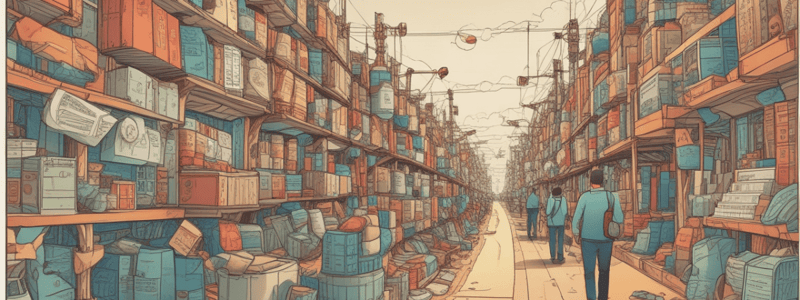Podcast
Questions and Answers
What is the fundamental economic problem that microeconomics tries to solve?
What is the fundamental economic problem that microeconomics tries to solve?
- How to increase the supply of natural resources
- How to increase human wants and desires
- How to allocate scarce resources to meet unlimited human wants and desires (correct)
- How to reduce the cost of production
What does the acronym 'CELL' represent in the context of economics?
What does the acronym 'CELL' represent in the context of economics?
- The four types of markets
- The four types of economic systems
- The four types of economic indicators
- The four types of resources (correct)
Which type of resource is associated with entrepreneurs or risk-takers who innovate and produce goods and services?
Which type of resource is associated with entrepreneurs or risk-takers who innovate and produce goods and services?
- Labor
- Capital
- Land
- Enterprise (correct)
What is the term for the cost of the next best alternative foregone when a choice is made?
What is the term for the cost of the next best alternative foregone when a choice is made?
Who decides what to produce in a market economy?
Who decides what to produce in a market economy?
What are the three fundamental choices to be made in allocating resources?
What are the three fundamental choices to be made in allocating resources?
What is the primary purpose of allocating scarce resources?
What is the primary purpose of allocating scarce resources?
What type of resource includes machinery and computers?
What type of resource includes machinery and computers?
What is the role of the government in a market economy?
What is the role of the government in a market economy?
What is a key concept in economics that helps measure the effectiveness of choices?
What is a key concept in economics that helps measure the effectiveness of choices?
What is the primary factor that determines what goods and services are produced in a market economy?
What is the primary factor that determines what goods and services are produced in a market economy?
What is the primary goal of studying economics?
What is the primary goal of studying economics?
The basic economic problem is allocating abundant resources to meet limited human wants and desires.
The basic economic problem is allocating abundant resources to meet limited human wants and desires.
Land is a man-made aid to production.
Land is a man-made aid to production.
In a market economy, the government decides what to produce based on consumer demand.
In a market economy, the government decides what to produce based on consumer demand.
Opportunity cost is the cost of producing a good or service.
Opportunity cost is the cost of producing a good or service.
The four factors of production are capital, labor, land, and management.
The four factors of production are capital, labor, land, and management.
Microeconomics studies how to allocate abundant resources to meet basic human needs.
Microeconomics studies how to allocate abundant resources to meet basic human needs.
What is the main reason why choices need to be made in allocating resources?
What is the main reason why choices need to be made in allocating resources?
What is the primary role of entrepreneurs in a market economy?
What is the primary role of entrepreneurs in a market economy?
What is the relationship between natural resources and the production of goods and services?
What is the relationship between natural resources and the production of goods and services?
What is the purpose of studying microeconomics?
What is the purpose of studying microeconomics?
What is the significance of opportunity cost in economics?
What is the significance of opportunity cost in economics?
How do businesses decide what to produce in a market economy?
How do businesses decide what to produce in a market economy?
Flashcards are hidden until you start studying
Study Notes
- Microeconomics studies how to best solve the basic economic problem, which is allocating scarce resources to meet unlimited human wants and desires.
- The four types of resources, also known as factors of production, are capital, enterprise, land, and labor, which can be remembered using the acronym "CELL".
- Capital refers to man-made aids to production, such as machinery, tractors, vehicles, factories, schools, hospitals, and computers.
- Enterprise refers to entrepreneurs or risk-takers who innovate and produce goods and services to make a profit.
- Land refers to natural resources, such as farmland and rainforests, where goods can be produced or extracted.
- Labor refers to human resources, or workers, who can produce goods and services.
- The world's scarce resources require difficult choices to be made to allocate them effectively, and economics is the study of these choices.
- There are three fundamental choices to be made in allocating resources: what to produce, how to produce it, and for whom to produce it.
- In a market economy, businesses decide what to produce based on consumer demand, how to produce it based on cost-effectiveness, and for whom to produce it based on who can afford the goods and services.
- The government can also intervene to help allocate resources more effectively.
- Opportunity cost is the cost of the next best alternative foregone when a choice is made, and it is a fundamental concept in economics for measuring the effectiveness of choices.
- Opportunity cost is calculated by comparing the value of the current choice with the value of the next best alternative that was given up.
- If the value of the current choice is greater than the value of the opportunity cost, it is considered a good decision, but if the value of the opportunity cost is greater, it is considered a bad decision.
Studying That Suits You
Use AI to generate personalized quizzes and flashcards to suit your learning preferences.




